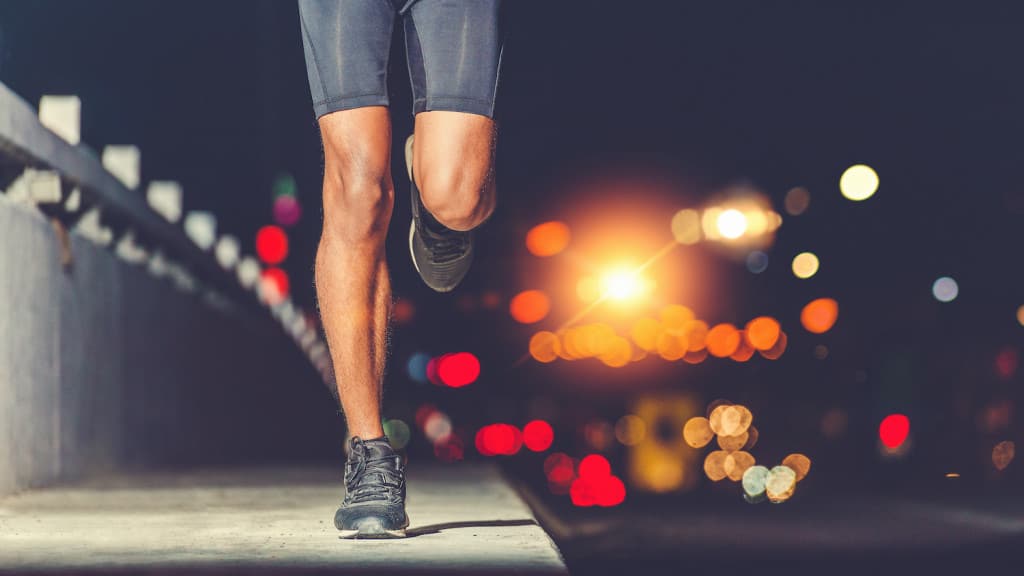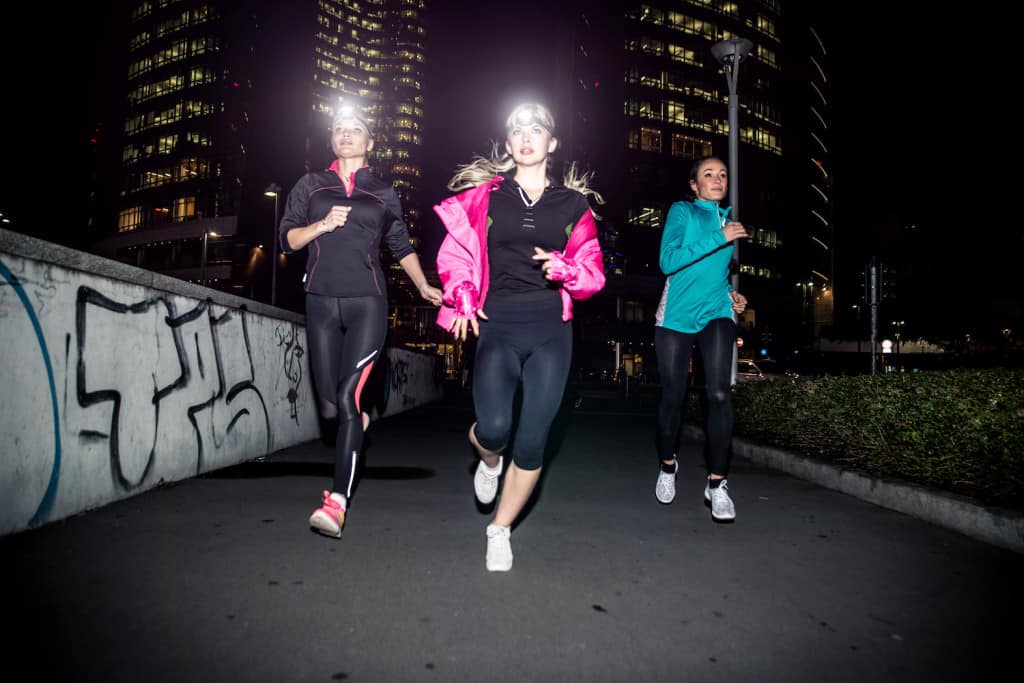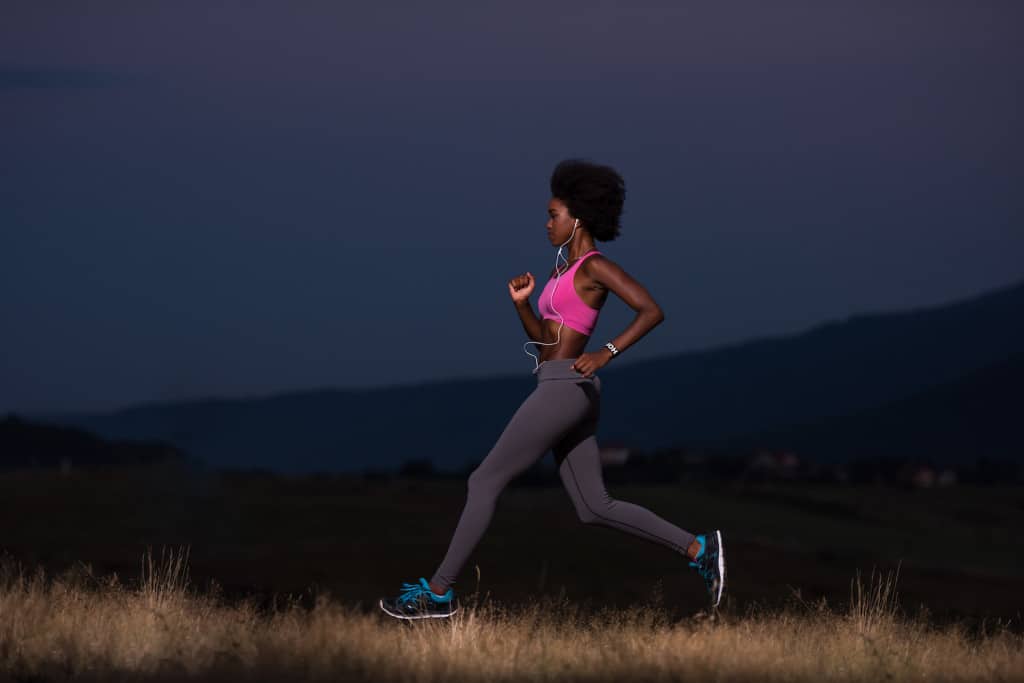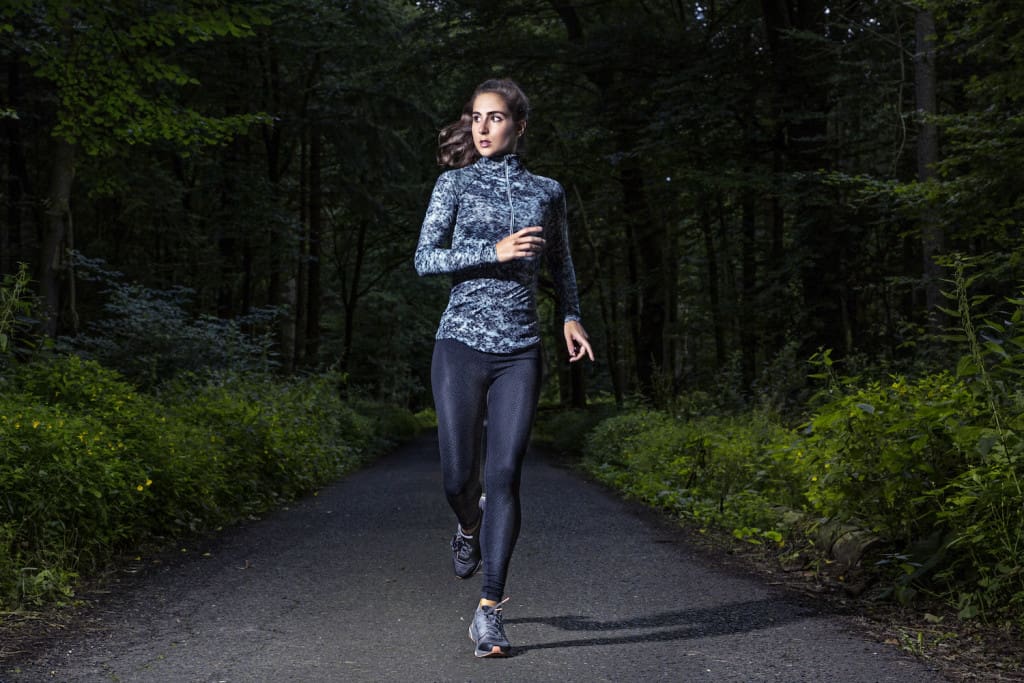Published on 11/09/2021
Last update on 10/04/2022
Let’s face it: we’re not all morning people–or morning runners.
When you’re busy working during the day, running in the morning or at night are likely your only two options. Sure, you can set your alarm and wake up extra early to squeeze in some exercise. But if you’re not naturally a morning person, getting used to this routine can make the experience more “hellish” than “wellness.”
Also, for marathon runners with busy schedules preparing for their next race, it may be difficult to find free spots. Most training plans recommend running up to 50 miles at peak week. That’s a lot of sessions to squizz in between other obligations!
So, where does that leave you? Well, if you find that you have more energy at night than early in the morning, consider taking up night running. Research suggests that nighttime runs may be more beneficial (1) than early morning runs since the average person’s core body temperature tends to peak between 5-7 p.m. With an increase in body temperature comes increased blood flow, oxygen (for the muscles), and, therefore, more energy.
With that in mind, this article will explore 9 of the best tips for running at night based on peer-reviewed studies. Lace-up your running shoes, and let’s get started!
1. Run on a well-lit route
First things first: to avoid easily preventable accidents and reduce the probability of assault, choose the most well-lit route for your night run. Doing so will make you more visible to cars and people and give you more peace of mind to relax and enjoy your run without worrying as much.
Running under some light, be it on a path or in the street, is one simple safety measure you can employ for night runs. Running in the dark becomes much safer if your running route is illuminated.
2. Wear reflective gear
Next, you must do your part to ensure that you are as visible as possible while running at night. One easy way to accomplish this is by wearing reflective shoes or clothing–particularly if you are running on a busy street or main road.
Finding reflective running gear isn’t difficult. Most major athletic brands carry reflective accessories, and you can also shop for what you need through online retailers. And no–you won’t need to look like a traffic cone to be highly visible. A reflective neon vest is probably unnecessary; instead, you can opt for an LED reflective belt or armband.

3. Bring your phone
If you’re like most people, your phone is pretty much an extra limb anyway, but you must keep your phone on you when you run at night.
There are a few reasons why it’s paramount that your phone comes with you on your night run. For starters, your phone likely has safety features that can make all the difference in an emergency. For instance, those with iPhone 8 or newer can hold down their lock and volume buttons for five seconds to release a siren noise, call emergency services, and share your location with your emergency contacts.
Your phone is also a flashlight and an instant lifeline to help, should you find yourself in an unfavorable situation; thus, it’s imperative that night runners bring their phone along while exercising.
4. Consider ditching the music
Listening to music when you run might not be the best idea.
Many people tend to blast their music through their headphones while training, which can drown out too much surrounding noise and make you less alert. This is less than ideal during a night run.
Instead of turning on the tunes, consider listening to an audiobook or podcast at a lower volume than you might listen to music. It’s easier to be more aware of and hear potential threats when you listen to one voice, rather than a whole band or orchestra!
5. Don’t run on an empty stomach
While there is some debate over whether it’s better to exercise on a full or empty stomach, the true answer lies somewhere in between. It’s best to opt for small, nutritious snacks before and after a night run.
Snacks containing complex carbohydrates and protein are an excellent way to regulate blood sugar and keep your blood pressure in check. It will help you avoid spikes, crashes, and lightheadedness, all of which are not conducive to a healthy training session.
If you are an early dinner eater, stick to your regular habits, and go for your run approximately 3-4 hours after eating. It should put you right around the 8-9 p.m. range for your night run.
6. Use the buddy system

Someone once said that there’s safety in numbers! With that in mind, why not ask your friends or a family member to join you on night runs?
In addition to helping pass the time (if you prefer the company of others to solitary exercise), using the buddy system can be an excellent way to avoid potential harm after dark. It can also make your night running experience a social one if you don’t have much time to see your friends or family as often as you’d like.
In short, running with friends or a family member can give you some extra peace of mind while running at night. They can also hold you accountable when you don’t feel like exercising after long days (or in less-than-ideal weather).
7. Track your run
Tracking your run is a great way not only to gauge your workout progress; it’s also one of our safety tips for running at night.
Apps like Strava and its Beacon feature make it very easy to share your location with your loved ones. Some Garmin watches also have this option natively with LiveTrack. Even better, some GPS watches have access to the LTE network for enhanced coverage, which can be useful if you run in remote areas with a poor connection signal.
At least your friends and family members will know where you end up if you deviate from the same route you always take. Tracking will enable you and your loved ones to have a clearer head during your evening run.
8. Stretch dynamically to avoid stiffness and injury
Much like a run during daylight hours, it’s essential to keep your muscles warm and flexible to avoid injury. The benefits of stretching and warming up, and cooling down as part of a workout are numerous.
However, you should not be doing just any stretches. Research shows that static stretches could in fact reduce muscular strength (2). Therefore, take 5-10 minutes before heading outside to stretch dynamically.
Jumping jacks, high-knees, and squats are all good for loosening up and getting warm before an evening run. After your run, walking, forward bends, child’s pose and butterfly are all good cool-down options.

9. Prepare for bed
Have an established bedtime routine (and stick to it) after your run to better prepare your body for sleep.
Many runners find their sleep is more restful when running past dark. It’s particularly true for those who feel tired after a run. There has been some debate over whether a late-night workout could adversely affect sleep quality, but actually, the opposite may be true, with the benefits outweighing any downsides.
When you get back from your run, begin your nighttime routine after cooling down. Rehydrate, take a hot shower (which will lower your core body temperature to prepare for sleep), and relax with a good book. Try to avoid phone or TV screens, which could keep you awake rather than help you sleep.
Are you a beginner? Check our guide: How to Start Running… And Enjoy It! (9 Tips for Beginners)
Frequently Asked Questions (FAQ)
Technically, running first thing puts you at greater risk for muscle strain or other accidents since it takes longer to get warmed up before starting your day (3). Running at night means that you will have had the whole day to move, get your body warm, and prepare for a good workout. You will probably find that you can even run faster at night than you can after just waking up since you are likely to have more energy at night.
Night running can promote higher-quality–and more relaxing–sleep. If you’re likely to hit the snooze button at 6 a.m. and feel less than energized rolling out of bed, night running is every bit as effective and healthy as a sunrise run and won’t diminish your quality of sleep (4).
Runners find that exercising a few hours after dinner, with proper warm-up and cool-down routines, can enhance their quality of sleep at night and have them getting some much-needed shut-eye that much faster.
Sources
(1) Morning and evening exercise.
Dae Yun Seo et al. (2013). Integrative Medicine Research.
https://www.ncbi.nlm.nih.gov/pmc/articles/PMC5481716/
(2) The effectiveness of exercise interventions to prevent sports injuries: a systematic review and meta-analysis of randomised controlled trials
Lauersen et al. (2013). British Journal of Sports Medicine.
https://bjsm.bmj.com/content/48/11/871
(3) Influence of time of day on all-out swimming.
C. Baxter and T. Reilly (1983). British Journal of Sports Medicine.
https://www.ncbi.nlm.nih.gov/pmc/articles/PMC1859021/
(4) Effects of Evening Exercise on Sleep in Healthy Participants: A Systematic Review and Meta-Analysis
Jan Stutz et al. (2019). Sports Medicine.
https://pubmed.ncbi.nlm.nih.gov/30374942/

